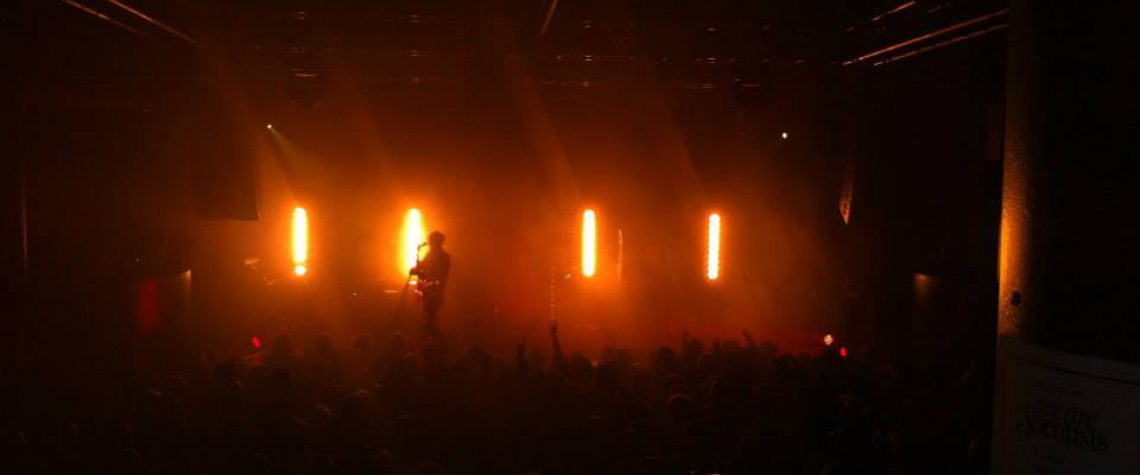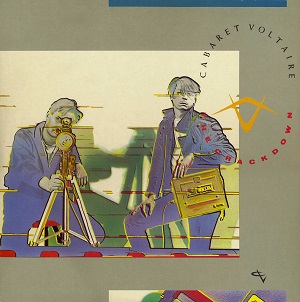Originally released 18th August 1983. Review originally published 1st August 2007.
Around the same time as the trashy veneer of New Romanticism began to tarnish, a sub-genre of electronic music – in the days when creating a slightly different time signature wasn’t cause to invent one – emerged, swiftly identifying itself as “Futurism” with it’s perpetrators attempting to distance themselves from the vacuous overtones of Spandau Ballet et al.
It’s elective principles were a million miles away from the preening, narcissitic elitism of London’s Blitz club and it’s art gone fash troubadours; the future it soundtracked didn’t accommodate human character traits like ego, instead being filled with cyborg technocratratic prophecies and nightmarish Orwellian systems of control. Visualised elegantly by Ridley Scott’s dystopian futurescapes in Blade Runner (And by most of the lysergically tinged work of the book’s author, Philip K. Dick, plus a little William Burroughs) here was a society which was the domain of the thought police, genetic facism and corporations replacing governments – anybody recognise anything familiar yet – in which homosapien inputs were increasingly peripheral to the mechanistic flow of production.
It’s vestiges were already self-evidentiary at the beginning of the eighties, labelled so-called science fact; fully robotic assembly lines, microprocessors the size of a pinhead and continuous satellite observation all helping to create a feeling of pernicious hysteria. Sheffield duo Stephen Mallinder and Richard H. Kirk had risen to prominence in the vapour trails of post-punk, a creative maelstrom which had opened the commercial floodgates to a cast of boho rogues who took their cues from Dada’s surrealist thought hijackings but who paradoxically viewed punk as the final bovine grunt of rock and roll’s outmoded dynamic. Unfashionable and largely isolated, the city had benefited from a left wing cultural liberalism which had provided free space for a rabble of proto-collectives: partially as a result, it had spawned a modernist enclave which included Clock DVA, The Human League and Heaven 17. For Cabaret Voltaire reaching a nadir with the critical success with the likes of Nag Nag Nag and Do the Mussolini (Headkick) had led to stagnation.
For the Cabs commercial breakout was never likely, but the frustration of playing to a small, loyal but narrow minded fanbase led them to a mini-reinvention. Brokered by industry terrorist Stevo, the duo signed to his Some Bizzarre label in a deal similar to that which the larger than life impresario had secured for Matt Johnson, whilst putting Virgin in charge of distribution and recorded The Crackdown with producer Flood and with the help of Soft Cell’s Dave Ball. With unprecedented access to state of the art technology, professional direction and a studio luxuriously appointed by comparison to their Western Works base the results were a precision tooled updating of the lopsided id, producing a record that nudged at mainstream dance aesthetics (Almost hitting the UK top 30) but unashamedly laced it’s subversion with so much uncut paranoia, processed doom and tabernacles of understated menace.
This then was the landscape of Dick’s A Scanner Darkly set to music; Kirk’s sibilant vocals, devoid of tone or melody bearing the inhuman quality of a mendacious autopilot. As a counterpoint, there was a state of the art sense of mekanikal crispness to the sequenced and processed background; opener 24/24 chattered with disembodied handclaps whilst on both the title track and Just Fascination it’s possible to spot the beginnings of what would become the industrial movement, a debt most obviously expressed on Front 242’s Headhunter.
It’s on the companion four track give away EP that the duo’s more avant garde leanings are most indulged; opener Diskono, all metal on metal percussion and wind tunnel vocals, is early diseased techo, Double Vision a spectrally minimalist eastern European hymn that somehow feels cold, Badge of Evil a Stockhausen-esque drone and Moscow, with it’s wailing alto-sax and murderous Bukowski ramblings, is almost Lynchian in it’s aspect. The Crackdown hasn’t aged well but sounds no more anachronistic than rave, jungle or Brian Eno – and it’s spectral world of paranoid delusion and visual cauterisation by media is now our every day routine personified.


1 Comment
Comments are closed.